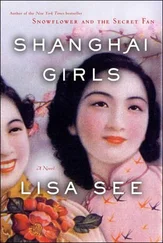Lisa See - Peony in Love
Здесь есть возможность читать онлайн «Lisa See - Peony in Love» весь текст электронной книги совершенно бесплатно (целиком полную версию без сокращений). В некоторых случаях можно слушать аудио, скачать через торрент в формате fb2 и присутствует краткое содержание. Жанр: Старинная литература, на английском языке. Описание произведения, (предисловие) а так же отзывы посетителей доступны на портале библиотеки ЛибКат.
- Название:Peony in Love
- Автор:
- Жанр:
- Год:неизвестен
- ISBN:нет данных
- Рейтинг книги:4 / 5. Голосов: 1
-
Избранное:Добавить в избранное
- Отзывы:
-
Ваша оценка:
- 80
- 1
- 2
- 3
- 4
- 5
Peony in Love: краткое содержание, описание и аннотация
Предлагаем к чтению аннотацию, описание, краткое содержание или предисловие (зависит от того, что написал сам автор книги «Peony in Love»). Если вы не нашли необходимую информацию о книге — напишите в комментариях, мы постараемся отыскать её.
Peony in Love — читать онлайн бесплатно полную книгу (весь текст) целиком
Ниже представлен текст книги, разбитый по страницам. Система сохранения места последней прочитанной страницы, позволяет с удобством читать онлайн бесплатно книгу «Peony in Love», без необходимости каждый раз заново искать на чём Вы остановились. Поставьте закладку, и сможете в любой момент перейти на страницу, на которой закончили чтение.
Интервал:
Закладка:
“Auntie Ze, may I borrow this?” Shen asked innocently. How could my sister-wife deny her?
And so The Peony Pavilion left the Wu family compound and traveled to another part of Hangzhou. I didn’t follow Shen, believing my project was safer in her hands than in Ze’s.
an i nv i tat i on arrive d for Ren, Ze, Li Shu, and Lin Yining to visit Shen and her husband. When the palanquins came to pick them up, I held on to Ze’s shoulders as she walked through the compound. When we reached her palanquin, she stepped inside and I climbed up to the roof. We were carried down Wushan Mountain, past the temple, and around the lake to Shen’s home. This wasn’t the haphazard roaming of a dead girl on her way to the afterworld or the frantic search for food and scraps during the Festival of Hungry Ghosts. At last I was doing the very thing that Ren had promised would happen once we were married: I was on an excursion.
We arrived at Shen’s house, and for the first time I stepped over a threshold that did not belong to my father or my husband. Shen met us in a pavilion covered by a wisteria vine that she said was two hundred years old. Huge clusters of the violet flowers hung down and swelled the air with the freshness of their scent. As promised, Shen had also invited established members of the literati. Her tutor, who had a long thin beard to show his age and wisdom, was given the chair of honor. The poet Hong Sheng and his pregnant wife arrived with gifts of wine and nuts. Several married women, some of them poets, congratulated Li Shu on the recent publication of her new drama. I was most impressed by the appearance of ( 1 8 1 )
Xu Shijun, who’d written Reflection on the Spring Wave about Xiaoqing. He was known for supporting the publication of women’s writings. Today he’d been invited to discuss the Buddhist sutras. My mother-in-law was right; Ren would make some interesting connections here today. He and Ze sat side by side, looking like the handsome young married couple they were.
The Book of Rites says that men and women should never use the same hangers, towels, or combs, let alone sit together. But here men and women—strangers—commingled with no regard to the old ways of thinking. Tea was poured. Sweetmeats were passed. I sat on the balustrade and got drunk on the vivid fragrance of the wisteria and the lines of poetry that flew back and forth across the pavilion like birds soaring in the clouds.
But when Shen’s tutor cleared his throat, everyone in the pavilion fell silent.
“We can recite and compose all afternoon,” he said, “but I’m curious about what Shen has let us read these past few weeks.” A few of the guests nodded in agreement. “Tell us”—the tutor addressed Ren—“about your commentary on The Peony Pavilion. ”
Surprised, I slipped from my perch. A gust of wind blew through the pavilion, causing the wives to pull the silk of their gowns closer to their bodies and the men to hunch their shoulders. I had little control over the effect my actions had on the natural world, but I tried to be quiescent.
When the air stilled, Shen looked at Ren, smiled, and asked, “How did you come to write the commentary?”
“Modesty doesn’t allow me to admit the depth of my feelings for the opera,” Ren answered, “but I haven’t written about it.”
“You are being modest,” the tutor said. “We know you’re an accomplished critic. You’ve written a lot about theater—”
“But never about The Peony Pavilion, ” Ren finished.
“How can this be?” the tutor asked. “My student returned from your home with a copy of The Peony Pavilion. Surely it is you who wrote your thoughts in the margins.”
“I haven’t written a thing,” Ren swore. He glanced questioningly at his wife, but she said nothing.
“After Shen read it, she passed it to me,” Hong Sheng’s wife commented lightly. “I don’t think a man could have had such sentiments.
Those words were written by a woman. I imagined a young one like me,”
she added, blushing.
The tutor waved away the idea as though it were a bad smell. “What I ( 1 8 2 )
read couldn’t have been written by a girl—or a woman, for that matter,”
he said. “Shen allowed me to show the commentary to others here in Hangzhou. To a man, to a woman”—and here he gestured to the others sitting in the pavilion—“we’ve been touched by the words. We’ve asked ourselves, Who could have had such amazing insights about tenderness, devotion, and love? Shen invited you here to answer that question for us.”
Ren touched Ze’s hand. “Is this your copy of The Peony Pavilion ? The one you worked on for so long? The one started by . . . ?”
Ze stared into the middle distance as though he were speaking to someone else.
“Who wrote these beautiful words?” Hong Sheng asked.
Even he had read my commentary? I forced myself not to move or cry out from happiness. Ren’s niece had done something extraordinary. She’d taken my thoughts not just to her home and to her tutor but to one of the country’s most popular writers.
Ze, meanwhile, had put a look of utter confusion on her face, as though she’d somehow forgotten who’d written in the margins.
“Was it your husband?” the tutor prompted.
“My husband?” Ze inclined her head in the way of all humble wives.
“My husband?” she repeated sweetly. Then after a long pause, she said,
“Yes, my husband.”
Was there no end to this woman’s torture of me? She had once been docile and easy to control, but she’d learned my lessons too well. She’d become too much of a good wife.
“But, Ze, I’ve written nothing about the opera,” Ren insisted. He looked at the others and added, “I know of the commentary, and I did not write it. Please,” he said to Shen. “May I see it?”
Shen nodded to a servant to get the book. Everyone waited, feeling awkward that husband and wife were in disagreement. Me? I balanced on my lily feet, trying to remain as still as possible, while inside my emotions were in a storm of fear, astonishment, and hopefulness.
The servant returned with the book and placed it in Ren’s hands. The guests watched as he turned the pages. I wanted to run to him, kneel before him, and stare into his eyes as he read my words. Do you hear me? But I kept myself in a grip of serenity. To interfere in any way—willfully or negligently—would have destroyed the moment. He flipped the pages, stopping here and there, and then he looked up with a curious expression of longing and loss.
“I didn’t write this. This commentary was begun by a woman who was ( 1 8 3 )
to be my wife.” He turned to Lin Yining and Li Shu, the two women to whom he was related. “You remember that I was to marry Chen Tong. She started this. My wife picked up the project and added her comments in the second half. Surely you who are of my blood know I speak the truth.”
“If what you say is true,” the tutor cut in before the women could respond, “why is Ze’s style so similar to Chen Tong’s that we cannot tell them apart?”
“Perhaps only a husband—a man who has known both women well—
would hear the two voices.”
“Love grows only when a couple is intimate,” Hong Sheng agreed.
“When the moon shines on West Lake, you do not see a husband alone in his room. When a jade hairpin falls onto the pillow, you do not see a wife alone. But please explain to us how an unmarried girl could know so much about love. And how is it you would know her voice if you were never married?”
“I think Master Wu speaks the truth,” one of the wives interrupted shyly, saving Ren from answering the awkward questions. “I found Chen Tong’s words to be romantic. Her sister-wife has also done a good job adding her thoughts about qing. ”
Читать дальшеИнтервал:
Закладка:
Похожие книги на «Peony in Love»
Представляем Вашему вниманию похожие книги на «Peony in Love» списком для выбора. Мы отобрали схожую по названию и смыслу литературу в надежде предоставить читателям больше вариантов отыскать новые, интересные, ещё непрочитанные произведения.
Обсуждение, отзывы о книге «Peony in Love» и просто собственные мнения читателей. Оставьте ваши комментарии, напишите, что Вы думаете о произведении, его смысле или главных героях. Укажите что конкретно понравилось, а что нет, и почему Вы так считаете.












